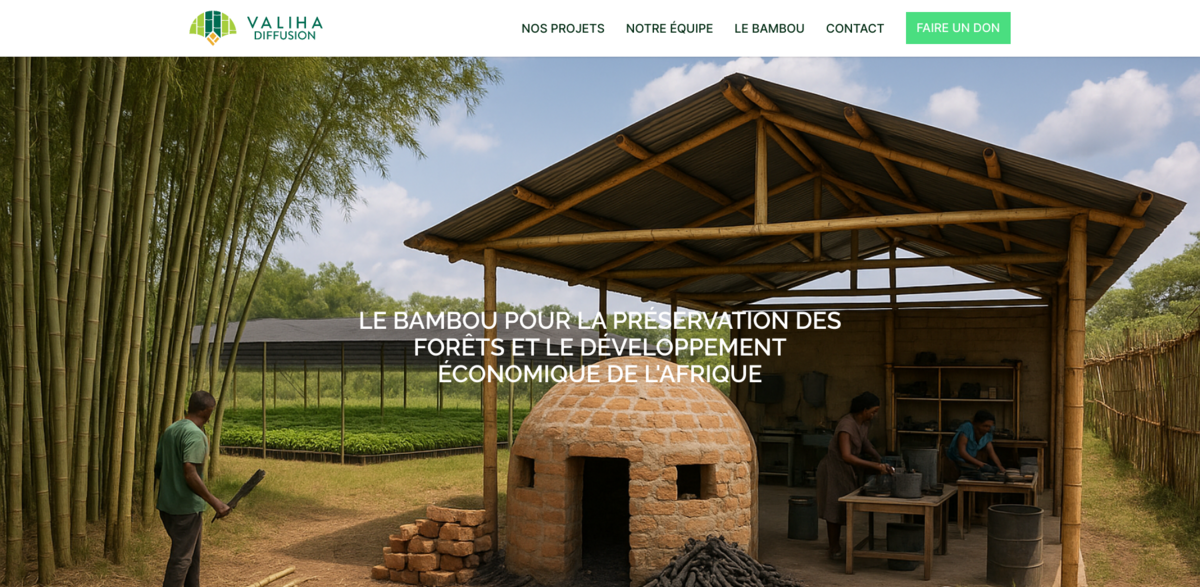What is the Valiha Diffusion Project?
Valiha Diffusion is an association dedicated to developing bamboo charcoal production chains across Africa. The goal? To fight deforestation and soil erosion while boosting economic growth on the continent. By planting bamboo, this project tackles some of Africa’s most pressing environmental and social challenges head-on. It’s about creating sustainable alternatives to wood energy, protecting forests, and supporting rural communities—all wrapped up in one powerful initiative.
The Main Benefit: Protecting Forests and Biodiversity
Every year, Africa loses nearly 2.8 million hectares of forest, mostly due to the rising demand for wood energy. This massive deforestation harms the environment, biodiversity, and climate. Bamboo offers a promising alternative because of its rapid growth and impressive biomass production. Here’s why it matters:
- Bamboo matures in just 4 to 5 years, much faster than traditional trees.
- Each hectare can produce between 15 and 40 tons of dry biomass annually.
- This biomass translates into 4 to 6 tons of bamboo charcoal briquettes per hectare.
- Bamboo plantations reduce pressure on natural forests, preserving habitats for many animal species.
Producing Clean and Efficient Energy
Bamboo charcoal is not just efficient—it’s cleaner too. With a calorific value of about 30.5 MJ/kg, it provides intense and long-lasting heat, perfect for cooking and heating. Unlike wood charcoal, bamboo charcoal burns without smoke, which means fewer respiratory problems for users. This makes it a healthier choice for households and communities relying on charcoal for daily energy needs.
Combating Climate Change Naturally
Bamboo is a superstar when it comes to capturing carbon. It absorbs 30 to 35% more CO2 than traditional tree forests and produces 30% more oxygen. Depending on the species and location, bamboo shoots can soak up between 96 and 392 tons of CO2 per hectare each year. Over 20 years, a well-managed bamboo plantation can help preserve about 20 hectares of primary forest—protecting vital ecosystems and fighting climate change in a big way.
Protecting Soils and Water Resources
Bamboo isn’t just about trees and charcoal—it’s a natural defender against soil erosion and desertification. Each bamboo rhizome can hold up to 6 cubic meters of soil, making it essential for stabilizing riverbanks and steep slopes. Plus, bamboo helps improve water infiltration into aquifers and safeguards wetlands, playing a key role in preserving water resources. It’s nature’s own way of keeping the land healthy and resilient.
Project Impact: Supporting Sustainable Development Goals
- Goal 13: Climate Action – Bamboo plantations absorb significant CO2, helping mitigate climate change.
- Goal 15: Life on Land – Protecting forests and biodiversity through sustainable bamboo cultivation.
- Goal 8: Decent Work and Economic Growth – Creating stable income opportunities for rural communities.
- Goal 12: Responsible Consumption and Production – Promoting sustainable energy alternatives.
- Goal 6: Clean Water and Sanitation – Enhancing water infiltration and protecting wetlands.
Economic Development Through Bamboo
The production and sale of bamboo charcoal open up real economic opportunities for rural areas. This isn’t just about planting bamboo—it’s about creating a whole value chain. From farmers tending the plantations to charcoal sellers in urban markets, many people benefit from this sustainable activity. Bamboo also shines as a building material—strong, flexible, and eco-friendly. Treated bamboo culms are prized for their durability, making them a smart choice for construction projects that care about the planet.






















